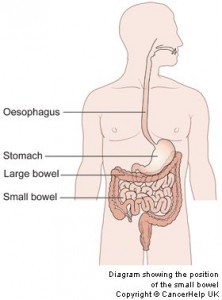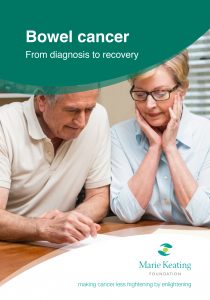
This page will cover:
Bowel cancer: The facts
- Colorectal cancer is also known as bowel cancer. Bowel cancer is cancer that starts in the large bowel (colon cancer) or back passage (rectal cancer).
- According to the 2023 National Cancer Registry of Ireland (NCRI) report, 2,560 men and women are diagnosed with bowel cancer in Ireland every year, 1,466 men and 1,093 women.
- It is the second most common cancer in men in Ireland and the third most common cancer in women after non-melanoma skin cancer. According to the WHO, bowel cancer is the third most common cancer worldwide, accounting for approximately 10% of all cancer cases and it is the second leading cause of cancer-related deaths worldwide.
- Colorectal cancer is the second most common cause of cancer death overall for men and women in Ireland after lung cancer with an average of 1,012 deaths per year or 9.7% of cancer deaths in females and 11.2% of cancer deaths in males.
- Around 1 in 20 people get bowel cancer. It is more common over the age of 60. Almost 18 out of 20 cases of bowel cancer in Ireland occur in people over 60.
- However, according to the NCRI cancer trends report in 2022, 22% of bowel cancers diagnosed during 2014-2018 were diagnosed at ages <60 years. 28% at 60-69 years and 50% at 70 years and over. Meaning a significant number of those diagnosed are before the screening age of 59.
The bowel and bowel cancer

The bowel is part of the digestive system. It is divided into two:
• The small bowel or small intestine
• The large bowel or colon and rectum
The food we eat ends up in the large bowel. Here, water and some nutrients are absorbed, leaving waste. Waste passes through the rest of the large bowel before leaving the body. Bowel cancer is cancer of the large bowel – colon and rectum.
Risks and causes of bowel cancer
The causes of most cases of bowel cancer are still unknown but research is going on all the time to establish why some people develop this disease. Researchers have already found several risk factors that may increase your chances of developing bowel cancer. These include:
- Age: the risk of developing colorectal cancer increases with age, with most cases occurring in individuals over 50 years old;
- Family history: a family history of colorectal cancer or certain genetic conditions, such as Lynch syndrome and familial adenomatous polyposis (FAP), can increase the risk;
- Personal history: individuals who have had colorectal cancer before or certain types of polyps are at a higher risk; and
- Lifestyle factors: unhealthy lifestyle choices, such as a diet high in processed meats and low in fruits and vegetables, sedentary behaviour, obesity, smoking and excessive alcohol consumption, can increase the risk;
- Digestive disorders: bowel cancer is more common in people who have conditions affecting the bowel. For example, Crohn’s disease or ulcerative colitis.
Bowel cancer- symptoms
• Changes in bowel habits such as diarrhoea, constipation, or narrowing of the stool for no obvious reason for six weeks or more
• Blood in the stool (rectal bleeding), either bright red or dark and tar-like
• Abdominal cramps, pain or bloating that won’t go away
• A lump in your back passage or tummy (abdomen)
• Unexplained weight loss that is sudden and losing weight without trying
• Feeling constantly tired and lacking energy, even with enough rest
• Iron deficiency anaemia due to chronic bleeding, causing fatigue, weakness and paleness
These can also be symptoms of conditions other than cancer but it’s important to see your doctor
How you can reduce your risk of bowel cancer
Bowel health is important. It may help to reduce your risk of developing bowel cancer if you eat:
• More fibres from cereals, beans, fruit and vegetables.
• Less fat including fatty meats and dairy foods.
• More poultry such as chicken and turkey, and fewer portions of red meat.
• Less cured and processed meat such as bacon, sausages and ham.
• More oily fish such as mackerel, salmon, tuna and sardines.
• Less sugary and fatty processed foods such as cakes biscuits and chocolate.
You can also reduce your risk by:
• Doing at least half an hour of moderate physical activity five times a week. The more active you are, the more you cut the risk of bowel cancer.
• Keeping a healthy weight.
• Drinking less alcohol. The less alcohol you drink, the lower the risk of bowel cancer and many other cancers and diseases.
• Being a non – smoker. If you smoke try to quit. To speak to an advisor, call the HSE Quit Team on Freephone 1800 201 203 or FREETEXT QUIT to 50100.
If a member of your family has been diagnosed with bowel cancer you should consult your doctor who may suggest a simple test to detect blood in your bowel motions (stools). There is more information on this test, called a FIT, below.
Remember, early detection of the disease is your best chance of a cure.
Screening for bowel cancer
Bowel screening aims to find bowel cancer at an early stage in people who have no symptoms. It is done with a simple home test called a FIT (faecal immunochemical test) which looks for tiny, invisible amounts of blood in your poo (stool). The poo (stool) test does not tell you if you have bowel cancer but it might tell you that you need more tests, such as a colonoscopy.
A colonoscopy is an examination of your bowel using a camera on the end of a thin flexible tube to look for any signs of disease in the lining of your bowel. A small sample of the lining of your bowel (biopsy) may be taken to look at more closely.
Bowel screening may also find other changes in the bowel, such as polyps, which are small growths that are not cancer but, if not removed, might turn into cancer. If polyps are found, they can be removed easily.
BowelScreen – The National Bowel Screening Programme offers regular, free bowel screening to men and women aged 59 to 69. Bowel screening involves a free, quick, easy-to-use home test every two years while in the age-range. You simply collect a poo sample on a sampling stick provided in your test kit and send it back to BowelScreen for analysis.
You can call BowelScreen on Freephone 1800 45 45 55 to check if you are on the register.
Screening results
Once you have sent your sample to BowelScreen, you will get a letter with the results in four weeks. Most people will have a normal result. If your results are not normal, this means that blood was found in your poo sample. It does not necessarily mean that you have bowel cancer but it does mean that you may need to have a colonoscopy.
Treatment for bowel cancer
Treatment depends on the stage of the cancer and where it is in the bowel. The main treatments for bowel cancer include surgery, chemotherapy, biological therapy and radiotherapy. It is important that you discuss your treatment with your doctor and let them know if you have any questions or concerns.
If you are undergoing treatment for bowel cancer, this website has information on:
- Coping with feelings and emotions after a cancer diagnosis
- Coping with fatigue from cancer
- Coping with other side effects and sexuality issues
- Advice on diet and nutrition during and after bowel cancer treatment
You can also download a copy of the free booklet, ‘Bowel Cancer: From diagnosis to recovery‘ here.

Other bowel cancer resources.
To download this information in leaflet format, Click Here
To ask a Marie Keating Nurse a specific question, please click here.
To visit the BowelScreen website, click here.
Donate to Marie Keating
We hope you found this information useful. The Marie Keating Foundation offers all of our services for free. Help support people at every step of a cancer journey by making a donation today.
DONATE
